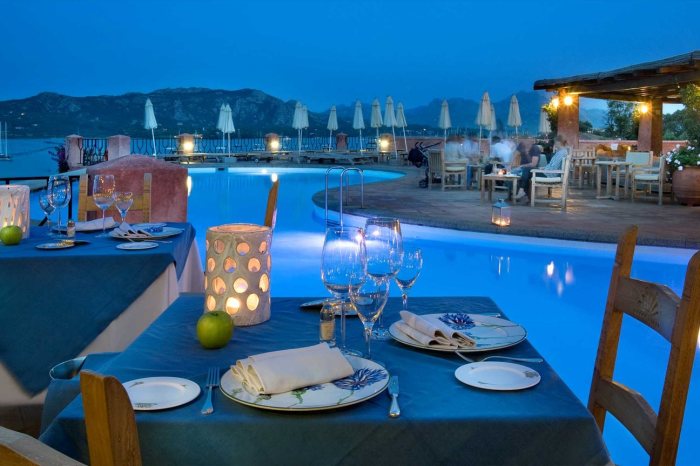Hotels That Are Perfect For Food And Wine Lovers
Hotels That Are Perfect for Food and Wine Lovers invite you on a delightful journey where every meal is an experience, and every sip tells a story. These hotels are more than just places to stay; they are culinary havens that celebrate the rich flavors and aromas of local and international cuisine.
With exceptional amenities, unique dining experiences, and collaborations with local producers, these hotels cater to those who cherish the art of food and wine. From on-site gourmet restaurants to engaging chef-led cooking classes, guests are immersed in a world where culinary passion flourishes.
Hotel Features for Food and Wine Lovers
For food and wine enthusiasts, the ideal hotel experience goes beyond mere comfort and luxury; it encompasses a rich tapestry of culinary adventures and exquisite tasting experiences. The right amenities and offerings can turn an ordinary stay into an unforgettable journey of flavors and refinement. Hotels specifically catering to these passions provide unique features that appeal to the sophisticated palate.On-site restaurants play a pivotal role in attracting food lovers.
They serve as culinary sanctuaries where guests can indulge in locally inspired dishes crafted by talented chefs. These restaurants often emphasize farm-to-table dining, ensuring that the freshest ingredients are sourced from nearby farms and markets. This not only supports local economies but also gives guests an authentic taste of the region’s culinary heritage. The ambiance of these dining spaces, often complemented by thoughtful decor and attentive service, enhances the overall experience, making each meal a memorable occasion.
On-Site Restaurants and Culinary Offerings
A well-curated on-site restaurant is essential for food and wine lovers seeking a seamless blend of convenience and quality. Such restaurants typically feature:
- Diverse Menus: Offering a variety of options that cater to different dietary preferences, including vegetarian, vegan, and gluten-free choices, ensuring all guests can find something delightful.
- Seasonal Ingredients: Highlighting the best local produce, meats, and seafood, allowing guests to savor the unique flavors of the area during their stay.
- Chef’s Specials: Regularly changing dishes that showcase the culinary team’s creativity and expertise, often inspired by seasonal themes or local festivals.
- Pairing Menus: Featuring suggested wine pairings for each course, enhancing the dining experience and encouraging guests to explore different flavor combinations.
The significance of wine cellars and tasting rooms is paramount in hotels designed for wine enthusiasts. These dedicated spaces offer insight into the world of wine, providing guests with both education and enjoyment.
Wine Cellars and Tasting Rooms
Wine cellars and tasting rooms within hotels create an intimate setting for exploration and appreciation of fine wines. Their presence adds an additional layer of charm and sophistication to a hotel stay. Key features of these spaces include:
- Curated Selections: A thoughtfully curated selection of wines from local vineyards as well as renowned global producers, catering to all tastes and preferences.
- Wine Tastings: Regularly scheduled tastings led by knowledgeable sommeliers, offering guests the opportunity to learn about different varietals and regions.
- Private Events: Offering private wine tastings or pairing dinners that allow guests to enjoy an exclusive culinary experience tailored to their preferences.
- Wine Education: Informative sessions on wine production, regions, and tasting techniques, providing guests with valuable knowledge that enhances their appreciation of wine.
“The best wines are those we drink with friends.” This philosophy often guides the creation of tasting rooms, where socializing and enjoyment are key components of the experience.
In essence, hotels that cater to food and wine lovers are not merely places to stay; they are destinations that celebrate gastronomy and viticulture, making every moment of a guest’s visit a culinary delight.
Culinary Experiences Offered by Hotels
Hotels have evolved to be more than just places to stay; they are now culinary destinations that provide unique dining experiences for food and wine lovers. From farm-to-table concepts to gourmet tasting menus, these offerings allow guests to indulge in the local flavors and culinary traditions of their destination while enjoying the comforts of luxury accommodations.One of the standout features of hotels catering to food enthusiasts is their ability to curate unique dining experiences that elevate the guest experience.
These experiences often combine local ingredients, expert culinary techniques, and immersive environments to create memorable meals. Guests can enjoy anything from intimate dinners under the stars to lavish brunches overlooking breathtaking landscapes.
Unique Dining Experiences
Hotels often provide exclusive dining experiences that reflect their location and culinary heritage. These experiences allow guests to connect deeper with the local culture and cuisine. Some noteworthy offerings include:
- Rooftop Dining: Enjoying a meal with panoramic views of the skyline or ocean creates a magical atmosphere, turning dinner into a breathtaking experience.
- Chef’s Table: A personalized dining experience where guests are seated in the kitchen or a special area, allowing them to interact with the chefs and witness the preparation of their meal.
- Themed Dinners: Hotels often host themed culinary nights, such as Italian pasta night or a seafood feast, featuring menus that celebrate a specific cuisine.
- Culinary Trails: Some hotels offer curated food trails where guests can explore local markets and farms, followed by a dining experience that showcases the ingredients sourced from the tour.
Chef-Led Cooking Classes
Chef-led cooking classes are a fantastic way for guests to immerse themselves in the culinary arts while gaining hands-on experience. These classes not only teach essential cooking techniques but also emphasize the importance of using fresh, local ingredients. Such experiences often include:
- Local Ingredient Focus: Participants learn to select and prepare dishes using seasonal produce and regional specialties, enhancing their understanding of local cuisine.
- Interactive Learning: Classes encourage guests to ask questions and engage with chefs, fostering a deeper connection to the culinary process.
- Recipe Takeaways: Guests often leave with recipes to replicate the dishes at home, allowing them to bring a piece of their experience back with them.
Wine Pairing Dinners and Special Food Events
Wine pairing dinners and special food events enhance the overall dining experience, providing guests with a deeper appreciation for the art of gastronomy. These events typically include:
- Sommelier Guidance: Expert sommeliers guide guests through wine selections that perfectly complement each course, elevating the dining experience.
- Themed Tasting Events: Hotels often host wine tastings or food festivals that showcase local wines and culinary creations, creating an engaging atmosphere for guests.
- Seasonal Celebrations: Special food events tied to local harvests or holidays allow guests to celebrate with unique dishes crafted by talented chefs.
“Culinary experiences at hotels are a feast for the senses, bringing together the art of cooking, the joy of sharing, and the beauty of ambiance.”
Best Destinations for Food and Wine Lovers
For those with a passion for cuisine and exceptional wines, certain destinations around the globe stand out as culinary havens. These locations not only offer world-class dining experiences but also feature hotels that cater specifically to food and wine enthusiasts. Discovering the local flavors and unique pairings enriches the overall travel experience, making these destinations truly unforgettable.The interplay between local cuisine and wine culture profoundly influences hotel offerings.
In many of these gastronomic cities, hotels partner with renowned chefs and local wineries, creating exclusive experiences for their guests. Whether it’s through curated tasting menus, cooking classes, or wine tours, hotels in these regions elevate the dining scene by immersing guests in the culinary heritage and innovations of the area.
Top Culinary Cities and Their Hotels
Here are some of the must-visit destinations for food and wine lovers, along with recommended hotels that enhance the culinary journey:
- Barcelona, Spain
-Known for its tapas and vibrant food markets, Barcelona’s Hotel Arts offers exquisite dining at its Michelin-starred restaurant, Enoteca. - Bordeaux, France
-Famous for its wine, Bordeaux features the Les Sources de Caudalie, where guests can indulge in wine therapy and local cuisine. - Tokyo, Japan
-With its blend of traditional and modern cuisine, the Mandarin Oriental Tokyo showcases culinary excellence through its multiple award-winning restaurants. - Florence, Italy
-Renowned for its rich culinary history, the Four Seasons Hotel Firenze offers cooking classes focusing on Tuscan dishes and wine pairings. - Napa Valley, USA
-A premier wine destination, the Auberge du Soleil boasts fine dining with panoramic views of vineyards and wine tasting experiences.
Each of these cities offers unique flavors and hotel experiences that reflect their culinary identities. From tapas in Spain to sushi in Japan, the local cuisine and wine selections shape the offerings at these hotels, making them ideal retreats for food and wine lovers looking to explore the best of gastronomy.
Collaborations with Local Producers
Hotels that collaborate with local farms and wineries create a unique blend of flavors and experiences that resonate with food and wine lovers. These partnerships not only enhance the quality of the dishes served but also support local economies and promote sustainability. By sourcing fresh, local ingredients, hotels can craft menus that reflect the region’s culinary heritage while delighting guests with a taste of the local culture.Collaborations with local producers offer numerous benefits, including fresher ingredients, reduced carbon footprint, and stronger community ties.
When hotels source their produce from nearby farms or wines from local vineyards, they ensure that the ingredients are at their peak freshness. Moreover, these practices contribute to sustainability, as they decrease transportation emissions and encourage responsible farming practices.
Examples of Hotels Sourcing Ingredients from Local Markets
Many hotels are leading the way in sourcing ingredients locally, which not only enhances their culinary offerings but also fosters a deeper connection with the surrounding community. Here are a few notable examples:
- Farmhouse Inn, Sonoma County, California: This luxury hotel partners with nearby farms to provide seasonal menus that highlight local produce and wines. Their commitment to sourcing locally has made them a favorite among food enthusiasts.
- Montage Deer Valley, Utah: This mountain resort collaborates with local ranchers and artisans to craft dishes that reflect the flavors of the region. Their farm-to-table approach ensures guests enjoy meals made from the freshest ingredients.
- The Ritz-Carlton, Amelia Island, Florida: The hotel’s culinary team works closely with local fishermen and farmers to serve sustainable seafood and organic produce. This partnership not only heightens the dining experience but also promotes environmental responsibility.
These collaborations not only elevate the gastronomic experience but also serve to educate guests about the regional agriculture and winemaking traditions. The guest experience is enriched as they enjoy meals that are not only delicious but also tell a story of the local land and its bounty.
“By sourcing ingredients from local markets, hotels can create an authentic connection between the culinary experience and the surrounding community.”
In essence, the collaboration between hotels and local producers cultivates a dining experience that is not only enjoyable but also rooted in sustainability and community support. This approach resonates with guests, creating memorable experiences that go beyond the plate.
Guest Reviews and Recommendations

Source: bonappetit.com
Guest reviews offer valuable insights into the culinary experiences at hotels, revealing the true essence of their food and wine offerings. The feedback from guests highlights not only the quality of food but also the overall dining atmosphere that enhances their stay. Analyzing these reviews can help both prospective guests and hotel managers understand preferences and improve services.Many guests share their thoughts on the exquisite culinary experiences they enjoyed, focusing on various aspects such as food quality, presentation, and the skill of the chefs.
Additionally, the ambiance and service play a crucial role in shaping their dining experience. Common themes emerge, with guests frequently noting the importance of local ingredients and unique pairing options that elevate their meals.
Notable Guest Reviews
An array of reviews showcases the diversity of culinary experiences offered at these hotels. From comments on innovative dishes to praise for wine selections, these guest testimonials reflect the hotels’ commitment to excellence.
-
“The farm-to-table concept at this hotel was a revelation. The freshness of the ingredients was evident in every bite.”
-A guest reflecting on their culinary journey.
-
“The wine pairing dinner was unforgettable, each glass perfectly complemented the dish. Truly a feast for the senses!”
-A review highlighting the expert wine selections.
-
“Dining under the stars made the experience magical. The taste of local cuisine paired with the beautiful setting created lasting memories.”
-A guest appreciating the ambiance.
-
“I loved the cooking class offered by the hotel! It was interactive and engaging, and I learned so much about local dishes.”
-Feedback on culinary experiences beyond traditional dining.
-
“The staff’s knowledge about the wine selections was impressive. They guided us to choices that we would have never picked ourselves.”
-A review commending excellent service.
An analysis of these reviews indicates that guests prioritize authenticity and unique experiences. Local culinary traditions, seasonal menus, and interactive dining options are highly favored. Many guests also express a desire for personalized service, where staff can recommend dishes and pairings based on individual preferences. As trends in guest feedback evolve, hotels are increasingly focusing on sustainability, with many highlighting their partnerships with local producers.
This commitment not only enhances the quality of their offerings but also resonates well with environmentally conscious travelers. The interplay between food, wine, and local culture continues to be a driving force in shaping memorable guest experiences.
Seasonal and Thematic Events
Seasonal and thematic events are essential for hotels looking to engage food and wine lovers. These occasions create a vibrant atmosphere, attracting guests with unique culinary experiences that celebrate the local culture and seasonal ingredients. By hosting these events, hotels can enhance their reputation as culinary destinations while offering memorable experiences that resonate with their guests’ passions.The importance of thematic wine festivals and food tastings cannot be overstated.
These events provide opportunities for guests to explore diverse flavors and learn about the origins of various cuisines and wines. They serve as a platform for culinary expression, allowing chefs and sommeliers to showcase their creativity while encouraging guests to step out of their culinary comfort zones. Engaging with local traditions during these events further deepens the connection between guests and the destination.
Seasonal Culinary Events
To captivate food and wine enthusiasts, hotels can host a variety of seasonal culinary events that highlight local ingredients and traditions. Here are some examples of events that can enrich the guest experience:
- Harvest Festivals: Celebrate the autumn season by inviting guests to join grape picking, wine pressing, and tastings of fresh harvest dishes crafted by the hotel’s chefs.
- Spring Fling Culinary Nights: Feature dishes made from seasonal spring vegetables and herbs, paired with refreshing wines to celebrate the renewal of nature.
- Summer BBQ and Wine Pairing Events: Organize outdoor barbecues showcasing grilled delicacies alongside local wines, creating a relaxed atmosphere for guests.
- Winter Holiday Feasts: Offer a special menu featuring traditional holiday dishes complemented by unique wine pairings, enhancing the festive spirit.
Incorporating Local Traditions
Many hotels can enhance their culinary events by infusing them with local traditions, making them more authentic and engaging for guests. This approach not only showcases the hotel’s commitment to local culture but also creates unforgettable experiences. Examples include:
- Regional Cooking Classes: Invite local chefs to conduct cooking classes that focus on traditional recipes and techniques unique to the region, allowing guests to immerse themselves in the local culinary heritage.
- Food and Wine Pairing with Local Producers: Collaborate with local winemakers and producers to host tasting events that highlight regional specialties, providing guests with a true taste of the locality.
- Themed Cultural Nights: Organize dinners that celebrate specific cultural festivals, featuring traditional dishes, music, and decorations that reflect local customs and history.
- Seasonal Markets: Set up seasonal markets on hotel premises, where guests can interact with local artisans and sample fresh ingredients, fostering a connection to the community.
“Seasonal and thematic events are not just about food; they are about creating memorable experiences that connect guests to the heart of the destination.”
Wellness and Culinary Tourism

Source: travelcurator.com
As travelers increasingly seek experiences that nourish both the body and soul, wellness-focused culinary tourism has emerged as a prominent trend within the hospitality industry. This innovative approach intertwines health-conscious dining with the luxury of gourmet experiences, offering guests a unique opportunity to indulge while prioritizing their well-being.The fusion of wellness and culinary tourism reflects a growing awareness of the impact food has on health.
Hotels are now curating menus that highlight nutritious ingredients without compromising flavor. By focusing on seasonal produce, lean proteins, and superfoods, these establishments create dishes that feel both indulgent and wholesome.
Wellness Menus in Hotels
A thoughtful wellness menu combines gourmet dining with health benefits, ensuring that guests can enjoy flavorful dishes that also enhance their well-being. Here are some essential elements to consider when crafting such menus:
- Farm-to-Table Ingredients: Emphasizing locally sourced produce not only supports local farmers but also ensures freshness and nutritional value.
- Superfood Selections: Incorporating ingredients like quinoa, kale, and chia seeds boosts the nutritional profile while adding exciting flavors.
- Plant-Based Options: Offering diverse vegetarian and vegan dishes caters to a growing audience interested in reducing meat consumption for health and environmental reasons.
- Mindful Pairings: Combining meals with herbal teas or infused water enhances the dining experience by promoting hydration and digestion.
Role of Wine in Wellness Retreats
Wine, often regarded as a luxurious indulgence, can also play a significant role in wellness retreats and hotels. When consumed in moderation, wine is associated with various health benefits, particularly red wine, which is rich in antioxidants. The integration of wine into wellness experiences can manifest in several ways, such as:
- Wine Tastings with a Health Focus: Many hotels offer tastings that highlight organic or biodynamic wines, emphasizing lower sulfite levels and natural production methods.
- Pairing Wine with Health-Conscious Dishes: Curating wine pairings that complement wellness menus can elevate the dining experience while enhancing flavors.
- Educational Workshops: Providing guests with knowledge about the health benefits of moderate wine consumption fosters a deeper appreciation and understanding.
- Therapeutic Wine Baths: Some wellness retreats have started incorporating wine into spa treatments, offering baths infused with red wine to promote skin health and relaxation.
By intertwining culinary experiences with a focus on wellness, hotels are not just providing meals; they are curating holistic experiences that nourish both the palate and the body.
Tips for Choosing the Right Hotel
When planning a getaway centered around food and wine, selecting the right hotel can significantly enhance your experience. The perfect accommodation should not only provide comfort and luxury but also showcase gastronomic delights and local flavors. To ensure an unforgettable culinary adventure, consider the following essential criteria and red flags when choosing your ideal hotel.
Criteria for Selecting Hotels for Food and Wine Lovers
Choosing the right hotel involves evaluating specific features that cater to culinary enthusiasts. Here are some important criteria to consider:
- Quality of Dining Options: Look for hotels with on-site restaurants renowned for their culinary excellence. Restaurants led by talented chefs often highlight regional dishes and use fresh, local ingredients.
- Culinary Experiences: Opt for hotels that offer cooking classes, wine tastings, or farm-to-table experiences, providing guests a chance to engage with the culinary world.
- Wine Selection: An impressive wine list featuring local and international selections is crucial. Hotels that collaborate with nearby vineyards often showcase the best of local terroir.
- Guest Reviews: Check online reviews and testimonials that specifically mention the food and dining experiences. Positive feedback from previous guests can be a strong indicator of quality.
- Local Partnerships: Hotels that partner with regional producers and farmers indicate a commitment to supporting the local economy and providing fresh produce.
Red Flags Indicating Poor Culinary Offerings
Identifying potential issues before booking can save disappointment during your stay. Here are signs that might indicate inadequate culinary offerings:
- Limited Dining Options: A hotel with only one dining venue that lacks variety may not be able to fulfill your culinary desires.
- Poor Reviews: Consistent negative feedback regarding food quality or service is a significant red flag. Take note of recurring complaints about the dining experience.
- Outdated Menus: A menu that has not been updated seasonally or lacks creativity may indicate a lack of commitment to culinary excellence.
- High Prices with Low Value: If prices are steep but feedback on portion sizes and flavors are lacking, it may suggest poor value for the dining experience.
Checklist for Evaluating Food and Wine Features
Creating a checklist can be a useful tool when evaluating hotels for your food and wine getaway. Here’s a practical guide to ensure you cover all bases:
- Research the Hotel’s Culinary Philosophy: Does the hotel emphasize local ingredients and culinary innovation?
- Assess On-Site Amenities: Is there a wine bar, gourmet shop, or a cooking school available on the premises?
- Inquire About Local Food Festivals: Does the hotel participate in or promote local food and wine festivals during your stay?
- Check for Seasonal Menus: Are there seasonal or themed menus that reflect the local culture and cuisine?
- Look for Packages: Are there culinary packages that include meals, classes, or tastings as part of your stay?
“The right hotel can elevate your food and wine journey, turning a simple getaway into a remarkable culinary exploration.”
Conclusive Thoughts

Source: co.uk
In conclusion, choosing a hotel that celebrates food and wine can transform your travels into unforgettable adventures. Whether you seek exquisite dining experiences, local culinary culture, or unique wine pairings, the right hotel enhances your journey and offers a taste of the destination’s heart and soul.
User Queries
What amenities should I look for in a food and wine hotel?
Look for on-site restaurants, wine cellars, cooking classes, and farm-to-table dining options.
Are there hotels that offer exclusive wine tasting events?
Yes, many hotels host special wine tasting events featuring local vineyards and sommeliers.
How can I find hotels that focus on local cuisine?
Research hotels in renowned culinary destinations and check reviews for mentions of local dishes and ingredients.
What types of seasonal events do food and wine hotels host?
Hotels often host seasonal festivals, wine pairings, and themed culinary events that celebrate local traditions and flavors.
Is wellness-focused dining common in food and wine hotels?
Yes, many hotels are incorporating wellness menus that prioritize healthy ingredients alongside gourmet options.









